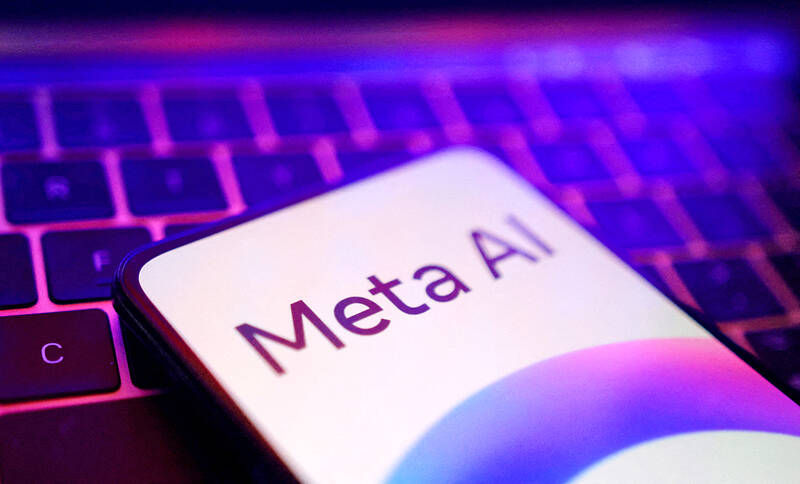Facebook parent company Meta Platforms Inc delayed its launch of the Meta artificial intelligence (AI) chatbot in Europe after regulators on the continent requested that the company pause its plan to train its large language models with posts from users there.
On Monday last week, Meta announced its intention to start training its large language model, called Llama, using public posts generated by European users.
On Friday, it updated that statement to say those plans have been delayed indefinitely after the Irish Data Protection Commission pushed back on the decision.

Photo: Reuters
“This is a step backwards for European innovation, competition in AI development and further delays bringing the benefits of AI to people in Europe,” Meta wrote in a blog post. “Put simply, without including local information we’d only be able to offer people a second-rate experience. This means we aren’t able to launch Meta AI in Europe at the moment.”
A Meta spokesperson confirmed the company still plans to bring these products to Europe, but declined to share a timeline for when that would happen. At the end of last year, Facebook had 308 million daily active users in Europe, to the company’s financial statements showed.
Meta has been pouring significant resources into AI technology to keep pace with other tech giants, including Alphabet Inc’s Google, Microsoft Corp and OpenAI. The company debuted its latest large language model, Llama 3, in April, and already offers its Meta AI assistant to users of its apps in the US. Large language models are the technology that underpins types of generative AI, including chatbots.
On Thursday, Meta was hit with a Norwegian complaint over its plans to use the images and posts of users on Facebook and Instagram to train AI models.
The process to opt out breaches strict EU data protection rules and “has been made deliberately cumbersome by using deceptive design patterns and vague wording,” the Norwegian Consumer Council said in a statement.
“We are urging the Data Protection Authority to assess the legality of Meta’s practices and to ensure that the company is operating in compliance of the law,” Norwegian Consumer Council director-general Inger Lise Blyverket said in the statement.
The legal complaint was written by the European Center for Digital Rights and would be submitted to the Norwegian Data Protection Authority and other European data protection authorities.
The Irish Data Protection Commission is the lead authority for Meta, which has its EU base in Dublin.

Six Taiwanese companies, including contract chipmaker Taiwan Semiconductor Manufacturing Co. (TSMC), made the 2025 Fortune Global 500 list of the world’s largest firms by revenue. In a report published by New York-based Fortune magazine on Tuesday, Hon Hai Precision Industry Co. (better known as Foxconn) ranked highest among Taiwanese firms, placing 28th with revenue of US$213.69 billion. Up 60 spots from last year, TSMC rose 60 places to reach No. 126 with US$90.16 billion in revenue, followed by Quanta Computer Inc. at 348th, Pegatron Corp. at 461st, CPC Corp., Taiwan at 494th and Wistron Corp. at 496th. According to Fortune, the world’s

NEW PRODUCTS: MediaTek plans to roll out new products this quarter, including a flagship mobile phone chip and a GB10 chip that it is codeveloping with Nvidia Corp MediaTek Inc (聯發科) yesterday projected that revenue this quarter would dip by 7 to 13 percent to between NT$130.1 billion and NT$140 billion (US$4.38 billion and US$4.71 billion), compared with NT$150.37 billion last quarter, which it attributed to subdued front-loading demand and unfavorable foreign exchange rates. The Hsinchu-based chip designer said that the forecast factored in the negative effects of an estimated 6 percent appreciation of the New Taiwan dollar against the greenback. “As some demand has been pulled into the first half of the year and resulted in a different quarterly pattern, we expect the third quarter revenue to decline sequentially,”

WEAKER ACTIVITY: The sharpest deterioration was seen in the electronics and optical components sector, with the production index falling 13.2 points to 44.5 Taiwan’s manufacturing sector last month contracted for a second consecutive month, with the purchasing managers’ index (PMI) slipping to 48, reflecting ongoing caution over trade uncertainties, the Chung-Hua Institution for Economic Research (CIER, 中華經濟研究院) said yesterday. The decline reflects growing caution among companies amid uncertainty surrounding US tariffs, semiconductor duties and automotive import levies, and it is also likely linked to fading front-loading activity, CIER president Lien Hsien-ming (連賢明) said. “Some clients have started shifting orders to Southeast Asian countries where tariff regimes are already clear,” Lien told a news conference. Firms across the supply chain are also lowering stock levels to mitigate

DIVERSIFYING: Taiwanese investors are reassessing their preference for US dollar assets and moving toward Europe amid a global shift away from the greenback Taiwanese investors are reassessing their long-held preference for US-dollar assets, shifting their bets to Europe in the latest move by global investors away from the greenback. Taiwanese funds holding European assets have seen an influx of investments recently, pushing their combined value to NT$13.7 billion (US$461 million) as of the end of last month, the highest since 2019, according to data compiled by Bloomberg. Over the first half of this year, Taiwanese investors have also poured NT$14.1 billion into Europe-focused funds based overseas, bringing total assets up to NT$134.8 billion, according to data from the Securities Investment Trust and Consulting Association (SITCA),